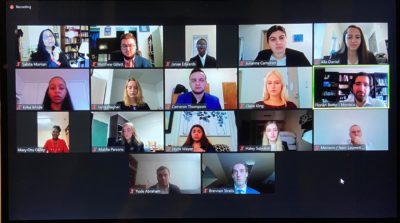University of Lynchburg students represented the Principality of Monaco in the National Model United Nations this week, winning a Position Paper Award and being named the “Distinguished Delegation.”
The event, held March 28-31, is the world’s largest intercollegiate Model United Nations simulation. It involves nearly 5,000 students from across the globe, more than half of whom are from outside the U.S. Lynchburg has sent a delegation for nearly 50 years.
“Our student-scholars put into praxis all that a liberal arts institution aspires to deliver,” Dr. Sabita Manian, professor of international relations and dean of the School of Social Sciences, said.
“Critical thinking, enriched writing skills, enhanced persuasive ability through their speech delivery, capability to engage in civil debate, consideration of options for problem-solving of global issues, listening to alternative perspectives, dexterity in networking with their peers from all over the world to find common ground, confidence in their competence to do all of the above, and ultimately to shape themselves to be responsible citizens.”

Usually, the NMUN is held in New York City. This year, due to the COVID-19 pandemic, it was held virtually. “During non-pandemic times, the most attractive part of the Model UN Simulation is that our students are in New York City for nearly a week,” Manian said.
“They work really long hours — longer than the virtual version — and are able to interact face-to-face with students from all over the world in the ‘city that never sleeps.’ It is such a novel academic learning experience for our students.”
Earlier in the spring semester, Lynchburg’s team members, who are all enrolled in National Model United Nations I or II, researched and wrote position papers for the committees they would serve on at the Model UN.
The research involved climate change, the COVID-19 pandemic, the illicit weapons trade, the rights of indigenous people, nuclear energy and weapons, empowering children and youth affected by conflict, sustainability, cybersecurity, and other global topics. Writing the papers prepared them for speeches they would make at the simulation.
The students also spent long hours, in and out of class, rehearsing their speeches and strategizing. They met via Zoom with their real, non-simulated counterparts: two UN diplomats from the Permanent Mission of Monaco.
Midway through the simulation, Manian was seeing the hard work pay off. “The simulation is going superbly,” she said. “I’ve actually witnessed our student-scholars blossom and grow in their confidence in a matter of days.
“Even those delegates who are reserved and introverted come out of their shells to fulfill their mission as representatives of the Principality of Monaco and as representatives of our University. … Our student delegates truly do us proud. They have been punctual, prompt to respond, professional and thoroughly well-prepared to tackle a global simulation such as this.”
This is the second year Erika Ikhide ’23, one of Lynchburg’s two head delegates, has participated in Model UN. Although last year’s event was canceled due to COVID-19, the experience was still “deeply enriching,” she said.
“[It] taught me research skills, the ability to cooperate, the ability to work well and proactively with others and, above all, the importance of diplomacy, both in my everyday life as well as on the international stage.
“I would highly recommend this experience, not only to international relations or political science majors, but to anyone who is interested in the firsthand experience of creating global change.”
Ikhide, an international relations and security studies major from Reston, Virginia, also credits her participation in the virtual Mid-Atlantic European Union Simulation this past November with helping her prepare for the virtual Model UN.
“This year, I combined my experience of Model UN prep with my experience of a virtual simulation, which I gained from participating in the EU this past fall,” she said. “I feel that I could not have been in a better position to aid my delegates in preparing for the virtual Model UN simulation this year.
“Despite everything being virtual, it has been incredibly exciting and a brand-new experience for everyone. Overall, this has taught me flexibility and leadership skills, which will help me later on in both my educational and formal career.”
This was the third time Matthew Gillett ’22, the team’s other head delegate, had participated in Model UN. The political science major from Oklahoma City said it has been an “incredible experience,” giving him the opportunity to learn more about the countries he’s represented and the United Nations itself, and to interact with students from around the world.
During this year’s event, for example, the Lynchburg delegation met with students from China, the Netherlands, and other countries. “One of the biggest takeaways from the simulation is the networking that takes place between delegates,” he said.
“The conference teaches you how to build connections and work toward a common goal [and] also provides the opportunity for students to understand how the UN operates in a hands-on way, offering a valuable introduction to diplomacy.”
In addition to the head delegates, Lynchburg’s Model UN delegation included the following students: Yude Abraham ’24, Julianna Cameron ’23, Alla Daniel ’23, Janae Edwards ’23, Keri Gallagher ’22, Claire King ’23, Jayde Mayer ’24, Mary Otu Okley ’24, Mahlia Parsons ’24, Haley Sabolcik ’24, Brennan Straits ’22, and Cameron Thompson ’21.
“I’m so incredibly proud of our delegates from the University of Lynchburg,” Gillett said. “They represented the University and the Principality of Monaco extremely well. They deserve a great deal of praise.”

